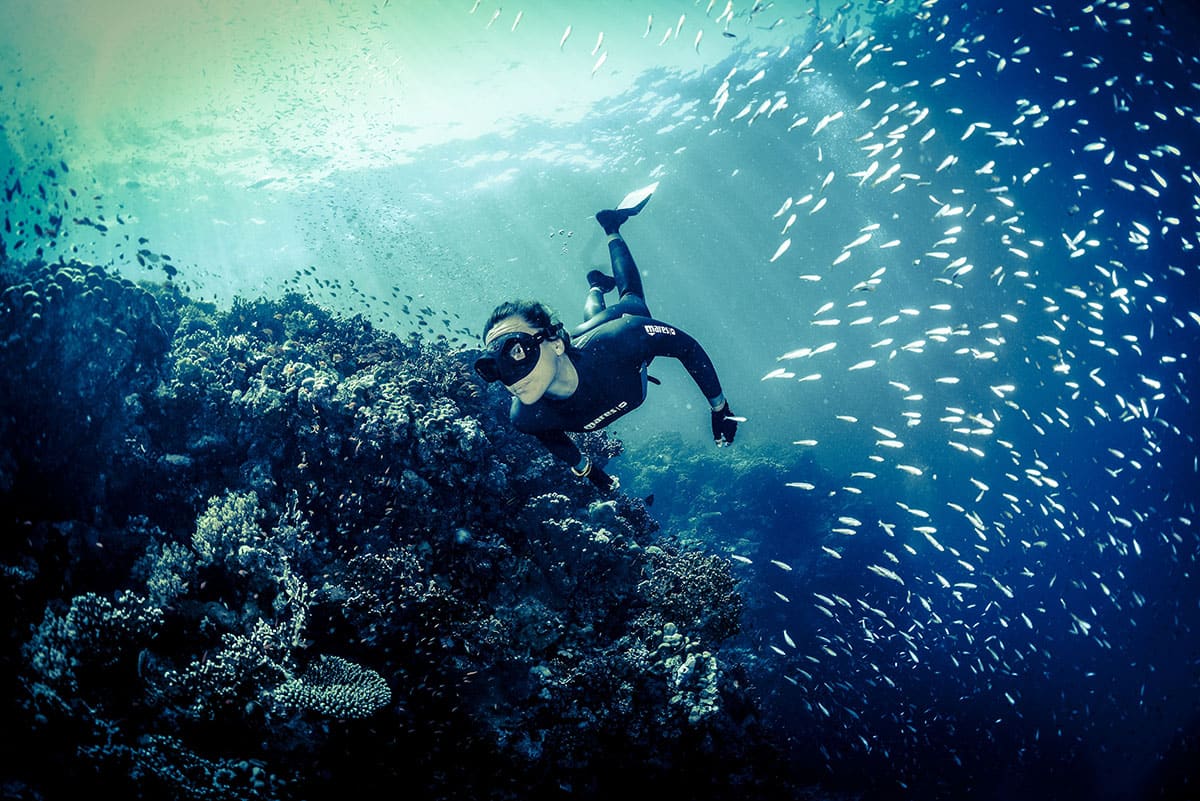What is apnea?
Apnea is the voluntary suspension of air intake for a certain period of time. Contrary to what it may seem at first, this does not mean that we stop breathing, since breathing consists of gas exchange and this process continues to occur in our body.
By practicing apnea we learn to optimize the use of oxygen available in our body for longer periods than usual, so that we could say that we increase the efficiency of our breathing. In no case are we without oxygen underwater as the gossips say. It is about training our body to tolerate and function correctly with lower levels of oxygen, not to endure in the absence of it.
Learning to freedive allows us to stay and enjoy underwater for longer, for recreational or sporting purposes.
Types of apnea?
Recreational and sports.
What is the first freediving course?
Basic Freediving is the first level of recreational freediving training, essential for learning this discipline from the ground up and practicing it safely and with the appropriate technique.
How many levels are there?
Freediving, like diving, is a training career without limits, but these are the following levels of training in freediving and complementary specialties offered by SSI:
- Basic Freediving
- Freediving Level 1
- Freediving Level 2
- Freediving Level 3
- Free immersion
- Monofin
- Training techniques
- React Right
- DPV
- Ecology programs
Who is it for?
It is aimed at those who are discovering freediving for the first time, but also for those people with previous experience, who want to improve their technique and develop their skills as a freediver, in the different disciplines.
What does it consist of?
We will learn the basic theoretical foundations of apnea to practice it safely, we will learn specific breathing and compensation techniques and we will improve our aquatic skills for the different modalities. In addition
What are the benefits of practicing apnea?
- Relaxation.
- Stress management
- It increases our self-esteem and confidence.
- Self-knowledge.
- Improving physical fitness.
- We develop discipline and commitment.
What other applications does it have?
- Surfing
- Yoga
- Stress management.
- Respiratory physiotherapy.
What if I get scared?
One of the objectives of this course is to eliminate false expectations and fears through self-knowledge and control of ourselves and our bodies. You will discover that freediving is a safe sport where the pressure to reach greater depth, distance or longer times has no place or meaning. There is no rush to reach any objective, each person must follow his or her own pace of progress. You decide the intensity and scope of each practice and we will accompany you so that you enjoy it and make the most of it.
How long does it last?
The course lasts 10 hours, spread over two days, generally Saturdays and Sundays from 09:00 to 14:00.
(Check availability for other dates or times)
What are the requirements to obtain certification?
In order to be certified in the Basic Freediver course, it is necessary to complete all the exercises correctly and safely, which does not mean that they have to be performed with perfect technique, since this is developed with practice, and for this we offer you the apnea training program that we have designed and will allow you grow as a freediver and enjoy your dives more and more.
Will I get any qualifications?
Upon completion of all the requirements you will obtain the Basic Freediving certification that enables you to dive with supervision up to 5 meters.
How long do I have to hold my breath?
You don't have to complete a specific time during this course, but you do need to learn the technique to identify the signals that your body gives you during freediving, become familiar with them and understand their meaning. Self-knowledge and the correct practice of freediving will make this mark improve as you train.
How many people can train at most at a time?
At our centre we believe that to learn freediving it is necessary to receive personal, professional and exclusive attention, which is why during the courses our ratio is 4 students per instructor. In this way we ensure that each student receives 100% of our attention, which translates into greater performance and achievement of objectives in our sessions, also guaranteeing the safety of the participants.
When can I do it?
We organize at least one session per month, but since our groups are very small, we are happy to offer new dates to accommodate anyone who is interested and has not had a place in previous courses.
Please check the following dates with us, and if they do not suit you, we will study an option for you.
What materials do I need?
All the material you need for the course is included, as well as registration for the online course, certification and photos.
You don't have to buy anything from scratch. We think it's best to try out different equipment configurations so you can see the differences and decide which one best suits your preferences, so that if you're interested in investing in your own equipment later on, you can choose the one that really suits you.
And what do I do when I finish it?
In the course you will learn the basics of freediving and all the tools you need to start developing as a freediver, but To improve, you have to put into practice everything you have learned.
To do this, you can sign up for our apnea training program, designed as alternative and dynamic apnea sessions that ensure enjoyment while training specific aspects.
You can sign up for the individual sessions that you are most interested in working on or get a discounted session voucher if you are looking for complete and balanced training to improve your skills as a freediver more quickly.








